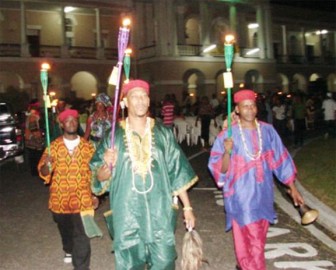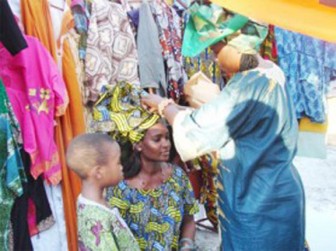We have previously made comments on different factors concerning Emancipation and the state of African culture in Guyana and the Caribbean. The attempt at this point is a more comprehensive summary of the crucial factors related to this subject from the point of view of cultural studies, and to pull together in one statement for clarity, emphasis and convenience, the relationship between Emancipation and the state of African culture, the way the anniversary of Emancipation is observed and the effect this has on a sense of its importance.
Most of these comments have been very critical, but one would wish to forestall any impression that they are negative. They arise from a lengthy period of research, observations and analysis, which have found first of all, that there are several positive and progressive cultural factors. But at the same time many things seem to be wrong with approaches and attitudes to the celebration of Emancipa-tion, the sense of its importance and its relations with African culture. An assessment of the state of African culture is that it is powerful, ever present and pervasive, but insufficiently researched, not very well known and in terms of survival – not in good health.
First, a summary of what is being said about the way the anniversary of Emancipation is observed. Limitations are put on it by both ‘outsiders’ and those directly involved. There is a certain amount of ‘othering.’ The tendency has been to regard Emancipation as an African thing – something that Africans celebrate; it is their festival, their concern, and while others acknowledge it, they do not really feel involved. This has often been reflected in the greetings extended to “our African brothers and sisters,” “the African community” or “African Guyanese” by various groups in the media. There has been an improvement in the last couple of years, with most of the greetings now being addressed “To all Guyanese.” But while they seem to have got the message, there remain elements of a continued relegation.
 Some of this relegation comes from the ‘insiders.’ Too many black people still see Emancipation and its celebration as exclusive to African descendants and treat it in such a way that it threatens to alienate others. It must be clearly pointed out here that it is indeed very relevant to people of African descent; it is and has always been one of their very ethnic celebrations which have at the core exhibitions of African cultural traditions and rituals. But these festivities need to be seen not as closed internal affairs exclusive to a community, but as outreach. While exhibiting blackness they are being used to celebrate a large international, not a small exclusive event.
Some of this relegation comes from the ‘insiders.’ Too many black people still see Emancipation and its celebration as exclusive to African descendants and treat it in such a way that it threatens to alienate others. It must be clearly pointed out here that it is indeed very relevant to people of African descent; it is and has always been one of their very ethnic celebrations which have at the core exhibitions of African cultural traditions and rituals. But these festivities need to be seen not as closed internal affairs exclusive to a community, but as outreach. While exhibiting blackness they are being used to celebrate a large international, not a small exclusive event.
Next, a re-emphasis of the wider significance of Emancipation; why it is not confined only to ‘Africans’ and why it involves everyone. It has international significance because it has affected and involved the world. It marked the end of slavery which was the largest practice of forced movement and forced labour of a people. It ended an infamous institution that, while practised in the Caribbean, reverberated across many continents and affected European colonial powers that slavery had enriched. Although we are talking about African slavery in the Caribbean which ended on August 1, 1838, it cannot be separated from African slavery in the Americas, and the fact that the USA was as involved as Europe.

Emancipation brought about a change in the world and set in train several other changes that took shape in the post-Emancipation years. These changes and repercussions were felt in demography, politics, economics, race relations and culture. The effects would have been most deeply felt in the ‘African diaspora,’ but they were responsible for the creation of post-colonial societies, cultural and artistic developments with important spin-off effects in the rest of the world. Emancipation opened the way for new dynamics and for the contributions of blacks to the development of several societies across the world.
In Guyana, as in Trinidad and Jamaica, it brought about a massive unified labour movement with what must have been the most widespread industrial action regarding the sale and withholding of labour in any industry in history. This directly led to the next large-scale immigration of people and changes in the demography of the region. The creation of plural societies and the settlement of all the other ethnic groups resulted from Emancipation. In Guyana these post-Emancipation developments led to the very important Village Movement and its contribution to social structure, social and cultural development in the country. Arising from these has been the powerful African contribution to the society which is integrated into it and inseparable from the rest of it. In equal measure, the strong East Indian presence is a result of Emancipation. The whole equally horrific experience of Indenture-ship came into being as a result of it, as was the still unsolved problem of racial tensions and animosity.

Having re-stated all of that, attention also needs to be paid to where, how and why Emancipation and the celebration of its anniversary do, in fact, concern and focus on Africans. Everything about the event has always been given a trademark African face and identity. That is because, despite the universal importance, significance and reference points, the black people have been most directly involved and affected. They were the ones enslaved and the concept of freedom can have no more deep relevance for any other people than for the blacks. African traditions formed the core of the original celebrations of freedom and in all the anniversaries over 174 years. It has been marked over all this time as one of the most distinct African traditional festivals in the Caribbean.
The very African identity and colour of the event should therefore be no surprise, and should indeed be expected. To add to that, the blacks are the ones with whom it is associated and it is regarded as the achievement of the former African slaves. It followed years of resistance including violent and bloody revolution. Emancipation has therefore been associated with the large spirit of struggle and freedom with enslaved Africans at the centre of it.
In Guyana this has also included the struggles to create and sustain the village movement. Not only were obstacles put in the way of the purchase of villages, but the provision of resources and maintenance by the colonial government was miserly and spitefully withheld. Historians describe the constant flooding and other sufferance.
However, an approach that sees Emancipation as too exclusively for the African community is unprogressive, suggests some degree of lack of awareness and contributes to a decline in the continuance of African culture. It is too inward-looking, minimising its importance and reach. It also loses an opportunity to improve Guyana’s race relations and attitudes to muli-ethnicity. It contributes to the insufficiency of goodwill and the tendency towards exclusive racial enclaves on all sides rather than multi-culturalism.
Another very important factor is this very decline in the vibrancy of surviving African culture. It is in an unhealthy state and was observed even in the Emancipation celebrations of 2012 in Guyana. It has waned for several reasons. One is the normal phenomenon of cultural change. Another is the different cultural politics of the contemporary popular culture. Yet others are the effects of cultural penetration, cultural diffusion, acculturation and the age of modern technology. All of these are to be carefully explained at another opportunity.
However, perhaps “the most unkindest cut of all” is the dire effects of self-destruction. Over a very long period of time black people have failed to, have been reluctant to, and have deliberately refused to pass on the African cultural traditions from one generation to the next, or to outsiders. Again, one can only bullet-point these factors in this particular discussion.
In the beginning there was the problem of prevention. The planter class and colonial authorities had a policy of suppression of African cultural expression during slavery and continued it after Emancipation with disapproval and legislation. Many traditions were driven underground. A number of others were deliberately restricted by the Africans because they were guarded by secret societies under whose stewardship they were performed.
But particularly after Emancipation and right into contemporary times there has been the curse of self-contempt. Many people see the practice of these traditions as unprogressive, backward, and/or they are ashamed of them. They guard them closely, keep them away from children to whom they refuse to impart them, and often pretend to strangers that they do not know them. Today, many persons are reluctant to admit knowledge and to talk to interviewers.
Also, there has been a genuine decline in knowledge and understanding of some African traditions because of their religious nature. They may belong to ancient religious belief that people have forgotten or no longer share, leading to a falling away in knowledge, interest or importance. In many instances there is some understanding of them, but there is the factor of fear. This fear has been observed where spiritualism is concerned. Many of these involve the engagement of spirits or spirit possession and many are deterred by those. Yet this spiritualism is a crucial part of several African cultural traditions. These, too, need to be properly explained in another discussion.




